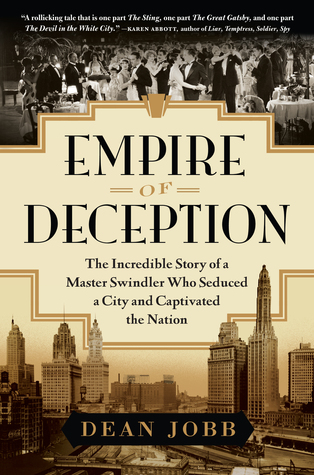 There's nothing better to kick off a weekend than a story about a swindler, amiright? Okay...maybe there are a few better ways, but this book is pretty much like a true financial-crime version of Law & Order, which we all know is one of the best shows ever, so I can't think of many better ways. In Empire, Jobb tells the story of Leo Koretz, who built a veritable financial empire (haha, I'm so funny) based on fake mortgages and stocks. The mortgages were supposedly based on property in Arkansas that was used to grow rice--and indeed, the property existed, it just wasn't really worth anything, let alone what Koretz was getting for it. The stocks, on the other hand, were a complete fabrication, based on a fictitious timber and oil company based in Panama. Between the two scams, Koretz made off with several million dollars, much of it taken from his friends and family, who had become desperate to invest in Koretz's fake company after he repeatedly told them "no." You know how it goes--the more someone tells you "no," the more you want what they're denying you. And so it went here, until Koretz absconded and the truth came out.
There's nothing better to kick off a weekend than a story about a swindler, amiright? Okay...maybe there are a few better ways, but this book is pretty much like a true financial-crime version of Law & Order, which we all know is one of the best shows ever, so I can't think of many better ways. In Empire, Jobb tells the story of Leo Koretz, who built a veritable financial empire (haha, I'm so funny) based on fake mortgages and stocks. The mortgages were supposedly based on property in Arkansas that was used to grow rice--and indeed, the property existed, it just wasn't really worth anything, let alone what Koretz was getting for it. The stocks, on the other hand, were a complete fabrication, based on a fictitious timber and oil company based in Panama. Between the two scams, Koretz made off with several million dollars, much of it taken from his friends and family, who had become desperate to invest in Koretz's fake company after he repeatedly told them "no." You know how it goes--the more someone tells you "no," the more you want what they're denying you. And so it went here, until Koretz absconded and the truth came out.Koretz did most of his swindling in the 1910's and 1920's, which leads Jobb to include more than a few allusions to The Great Gatsby, which doesn't really seem fair because other than liking parties and spending money, Koretz was nothing like the fictitious Gatsby. However, the drama mostly takes place in Chicago and, to a lesser extent, Nova Scotia, which are two areas that are seldom examined in histories of the era, so getting a peek at them was awesome. Koretz was busy swindling long before and long after Ponzi's fraud scheme began and ended, while Al Capone was clawing his way up the gang ladder, and while the entire nation was plunging head-first into the Jazz Age, which leads to a ton of colorful background for Jobb's tale. Also getting some page-time is Robert Crowe, an attorney who once worked with Koretz and takes up the task of finding and prosecuting him after he escapes. At times, the writing can get a bit dry, especially when Jobb dives off into using too many quotes. Don't get me wrong, quotes are good, and can lend a lot of flavor to a book, but too many of them can be distracting and can let the mind wander while the action isn't advancing. Overall, however, I found the writing engaging and the book a pretty easy read. It's also much shorter than it initially appears, because a good chunk of the pages are devoted to notes on sources, which is a solid use of page space for any history book worth its salt. But don't worry; footnotes and annotations don't weigh this one down, and the citations are tucked neatly away in the back where they won't distract you during your read. Though if you do want to find the citation for something, that might make it a bit difficult...
Overall, though, a fun read. Not one of my favorite history books and not one I'm likely to read again, but good nonetheless.
3.5 stars out of 5.
No comments:
Post a Comment